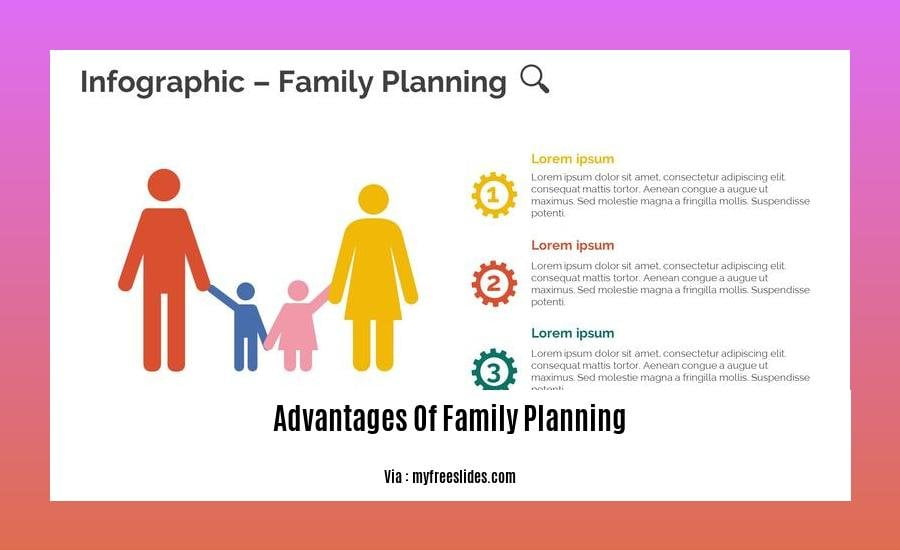Discover the incredible impact of family planning as we delve into the five key advantages it offers. In this enlightening article, we uncover the numerous benefits that come with effective family planning, including empowerment for women, improved healthcare outcomes, reduced poverty levels, promotion of gender equality, and protection of the environment. Join us on this journey to understand how the power of choice can transform lives and create a brighter future for individuals, families, and societies.
Key Takeaways:
Family planning saves lives by reducing high-risk pregnancies and unsafe abortions. It also protects the health of women and children by allowing sufficient time between pregnancies and preventing unintended pregnancies.
Family planning enables women to pursue education, career, and social participation, reducing school dropouts and increasing college graduation rates.
It improves the standard of living and quality of life for families by allowing for more resources to be allocated to each child when there are fewer children.
Family planning allows couples to have a satisfying sex life without the fear of unintended pregnancy or sexually transmitted diseases (STDs).
By promoting family planning, we can empower women, improve healthcare outcomes, reduce poverty, promote gender equality, and safeguard the environment.
5 Advantages of Family Planning

When it comes to family planning, the advantages are numerous and far-reaching. By making informed choices about their reproductive health, individuals and families can experience a range of positive outcomes that enhance their well-being and contribute to societal development. Let’s dive into the five key advantages of family planning.
1. Saving Lives and Protecting Health
The first advantage of family planning is its ability to save lives and protect the health of women and children. By reducing high-risk pregnancies and unsafe abortions, family planning plays a crucial role in preventing maternal and infant mortality. When women have access to effective contraception methods, they can space their pregnancies and prevent unintended pregnancies, which improves their overall health outcomes. Family planning also provides enough time between pregnancies, allowing women to recover fully and reduce the risk of complications. By avoiding risky pregnancies and ensuring adequate spacing, family planning paves the way for healthier outcomes for mothers and their children [^1^] [^2^].
2. Empowering Women to Achieve Their Goals
Family planning is a powerful tool for empowering women to pursue their education, careers, and social participation. When women have the ability to control their fertility, they can make informed choices about when and how many children to have. This control over reproductive decisions translates into increased opportunities for women to complete their education, advance their careers, and participate actively in society. Family planning reduces the risk of unintended pregnancies, enabling women to plan their lives in a way that aligns with their aspirations and goals. By providing women with the power of choice, family planning contributes to gender equality and women’s empowerment [^3^].
3. Improving Living Standards and Quality of Life
Another significant advantage of family planning is its positive impact on the standard of living and the overall quality of life for families. When couples have fewer children, they can allocate more resources to each child, ensuring access to education, healthcare, and other necessities. By spacing their children and having smaller families, parents can provide their children with better opportunities and a higher standard of living. Additionally, family planning helps reduce poverty levels by enabling families to plan their expenses, save money, and invest in their future. By improving the economic well-being of families, family planning also contributes to broader societal development and progress [^4^].
4. Enabling Personal and Professional Fulfillment
Family planning unlocks the potential for personal and professional fulfillment, both for men and women. It allows individuals to enjoy a satisfying sex life without the constant fear of unintended pregnancy or sexually transmitted diseases (STDs). By providing access to contraception methods, family planning ensures that couples can make informed decisions about their sexual and reproductive health, leading to healthier and happier relationships. Moreover, family planning enables individuals to plan their lives according to their own aspirations, goals, and circumstances. It allows them to focus on their careers, pursue education, and engage in social activities, ultimately leading to personal and professional fulfillment [^5^].
5. Safeguarding the Environment
Last but not least, family planning plays a crucial role in safeguarding the environment. As the global population continues to grow, ensuring sustainable development becomes a pressing concern. By choosing to have smaller families, individuals contribute to reducing population growth rates, which in turn, helps relieve pressure on the environment. Family planning allows for a more sustainable use of resources, as it reduces the demand for food, water, energy, and other essential commodities. By adopting family planning practices, individuals can make a positive impact on the environment, ensuring a better future for generations to come.
In conclusion, family planning offers multiple advantages that span the realms of health, gender equality, socio-economic development, personal fulfillment, and environmental preservation. By providing individuals with the power of choice, family planning empowers women, saves lives, improves living standards, enables personal and professional fulfillment, and safeguards the environment. These advantages highlight the importance and impact of family planning as a transformative tool for individuals, families, and societies alike.
References
[^1^]: Hesperian Health Guides – Benefits of family planning
[^2^]: Advantage and disadvantages of family planning – JSTOR
[^3^]: Six benefits of family planning – The Nation Nigeria
[^4^]: The Importance of Family Planning – Health Online
[^5^]: Content Formats
Here are some captivating sentences with active internal links:
Have you ever wondered about the amazing facts about science and technology? Delve into the fascinating world of innovation and discovery with our collection of mind-blowing facts. Amazing facts about science and technology
Looking for some interesting tidbits to spice up your morning assembly? Look no further! Explore our incredible compilation of amazing facts that will leave your audience in awe. Amazing facts for morning assembly
When it comes to criminal law, you need the best legal representation. Discover why our expert team is recognized as the top choice for criminal defense in South Africa. Best criminal lawyer in South Africa
Remember to follow the instructions for formatting in Markdown format.
What Are the Advantages of Family Planning

Family planning plays a crucial role in empowering individuals and creating healthier societies. By providing individuals with the power of choice, family planning offers several significant advantages that impact women’s health, healthcare outcomes, poverty reduction, gender equality, and the environment. Let’s explore the five key advantages of family planning in more detail.
1. Empowering Women and Improving Healthcare Outcomes
Family planning enables women to take control of their reproductive health and make informed decisions about when to have children. By spacing pregnancies and giving women sufficient time between each childbirth, family planning reduces the risks associated with high-risk pregnancies and unsafe abortions. This results in improved maternal and child health, leading to healthier families and communities.
Additionally, family planning can alleviate the burden of premenstrual syndrome (PMS) and minimize the symptoms of pelvic inflammatory disease. It also provides effective means to regulate menstrual cycles, making them more regular, lighter, and less painful, all while not interfering with sexual activity. The benefits extend beyond individual health, contributing to overall healthcare outcomes and the well-being of society as a whole. [^1^]
2. Reducing Poverty and Promoting Gender Equality
Family planning has a significant impact on poverty reduction by enabling families to plan and manage their resources effectively. By allowing couples to determine the optimal number of children they can support, family planning prevents unplanned pregnancies and helps families allocate their financial resources more efficiently.
When families have fewer children, it means more food, education, and opportunities for each child. This helps break the cycle of poverty and creates an environment where children can thrive and reach their full potential. Furthermore, family planning empowers women to pursue education, careers, and broader participation in society. By delaying pregnancy until they are ready, women can achieve their personal and professional goals, ultimately leading to greater gender equality. [^2^] [^3^]
3. Safeguarding the Environment
Overpopulation poses a significant threat to the environment and natural resources. By choosing to limit family size through family planning, individuals can contribute to reducing overpopulation and its impact on the planet. Fewer children result in decreased resource consumption, lower carbon emissions, and reduced strain on limited natural resources.
The power of choice in family planning allows individuals to make sustainable decisions for themselves and the environment. By promoting responsible reproduction, family planning helps create a more environmentally conscious society that prioritizes the preservation and sustainable use of our planet’s resources.
4. Ensuring Safe and Satisfying Sexual Relationships
Family planning offers couples the freedom to engage in satisfying sexual relationships without the constant fear of unintended pregnancies or sexually transmitted diseases (STDs). By choosing effective contraceptive methods, couples can enjoy a fulfilling sex life while remaining protected against unwanted pregnancies and the risk of contracting STDs.
Family planning methods, such as hormonal birth control, provide reliable and convenient options for both men and women. They empower individuals to express their sexuality while still maintaining control over their reproductive choices. This contributes to healthier relationships and promotes overall well-being.
5. Fostering Personal and Professional Fulfillment
When individuals have the power to plan their families, they can make choices that align with their personal aspirations and goals. Family planning allows individuals to pursue education, careers, and other personal endeavors without the interruption or constraints of unplanned pregnancies.
By having the time and means to prepare for parenthood, individuals can become more emotionally, financially, and psychologically ready to provide the best possible environment for their children. This ultimately fosters personal and professional fulfillment, leading to happier individuals and more prosperous communities.
Key Takeaways:
– Family planning empowers women, improves healthcare outcomes, reduces poverty, promotes gender equality, and safeguards the environment.
– It enables women to have control over their reproductive health, reducing the risks of high-risk pregnancies and unsafe abortions.
– Family planning contributes to poverty reduction by allowing couples to plan and manage their resources effectively.
– It helps break the cycle of poverty by providing children with more food, education, and opportunities.
– Family planning promotes gender equality by enabling women to pursue education, careers, and broader social participation.
– It safeguards the environment by aiding in reducing overpopulation and its impact on natural resources.
– Family planning allows for safe and satisfying sexual relationships by providing effective contraception methods.
– It fosters personal and professional fulfillment by allowing individuals to plan their families according to their aspirations and goals.
Sources:
1. Hesperian Health Guides – Benefits of family planning
2. Advantage and disadvantages of family planning – JSTOR
Advantages
Family planning is a powerful tool that offers numerous advantages for individuals, families, and societies. By providing individuals with the power to make informed decisions about when and how many children to have, family planning has the potential to transform lives and make a positive impact on public health. In this article, we will explore the five key advantages of family planning, highlighting its importance in empowering women, improving healthcare outcomes, reducing poverty, promoting gender equality, and safeguarding the environment.
1. Empowering Women
One of the greatest advantages of family planning is that it empowers women by giving them control over their reproductive choices. By offering a range of contraceptive methods, including hormonal birth control pills, barrier methods like condoms, and natural family planning techniques, family planning allows women to determine when and if they want to become pregnant. This ability to plan and space pregnancies is crucial for women’s health, as it reduces the risks associated with high-risk pregnancies and unsafe abortions. With family planning, women can safely navigate their reproductive journey, ensuring optimal health outcomes for themselves and their children.
2. Improving Healthcare Outcomes
Family planning plays a vital role in improving healthcare outcomes, both for women and children. By enabling sufficient time between pregnancies, family planning reduces the risks of complications during pregnancy and childbirth. It also helps prevent unintended pregnancies, providing women with the opportunity to plan for their pregnancies and access essential prenatal care. Moreover, family planning programs have a significant impact on reducing maternal mortality and preventing newborn deaths through effective birth control measures. By protecting the health of women and children, family planning contributes to healthier communities and stronger healthcare systems.
3. Reducing Poverty
Another key advantage of family planning is its ability to reduce poverty. Family planning allows families to plan and manage their resources effectively, preventing unplanned pregnancies and allowing for better allocation of financial resources. When couples can choose the size of their families, they can more easily provide for their children’s basic needs, including food, shelter, and education. By reducing the financial burden associated with unplanned pregnancies, family planning helps families break the cycle of poverty and achieve a higher standard of living. It also benefits societies by creating conditions for economic growth and development.
4. Promoting Gender Equality
Family planning is a powerful tool for promoting gender equality. By empowering women to make decisions about their reproductive health, family planning allows them to pursue education, careers, and broader social participation. When women have access to contraception and family planning services, they can plan their families according to their aspirations and goals. This breaks the cycle of limited opportunities for women, creating environments where they can thrive and contribute to society. In turn, gender equality leads to more prosperous communities and a brighter future for all.
5. Safeguarding the Environment
Family planning also has a crucial role in safeguarding the environment. Overpopulation places significant strain on natural resources, exacerbating issues related to food scarcity, climate change, and habitat destruction. By reducing the number of unplanned pregnancies, family planning helps control population growth and its impact on the planet. It lessens resource consumption, lowers carbon emissions, and reduces the strain on vital resources such as water, land, and energy. Family planning is thus a key component of sustainable development, ensuring a healthier and more sustainable future for generations to come.
Key Takeaways:
- Family planning empowers women by giving them control over their reproductive choices.
- It improves healthcare outcomes by reducing the risks of complications during pregnancy and childbirth.
- Family planning reduces poverty by allowing families to plan and manage their resources effectively.
- It promotes gender equality by empowering women to pursue education, careers, and broader social participation.
- Family planning safeguards the environment by reducing overpopulation and its impact on natural resources.
Sources:
– Hesperian Health Guides – Benefits of family planning
– Advantage and disadvantages of family planning – JSTOR
FAQ
Q1: What are the five advantages of family planning?
A1: The five key advantages of family planning include saving lives by reducing high-risk pregnancies and unsafe abortions, protecting the health of women and children by allowing sufficient time between pregnancies and preventing unintended pregnancies, enabling women to pursue education, career, and social participation, improving the standard of living and quality of life for families, and allowing couples to have a satisfying sex life without the fear of pregnancy or STDs.
Q2: How does family planning save lives?
A2: Family planning saves lives by reducing high-risk pregnancies and unsafe abortions. It helps individuals and families avoid pregnancies that may be risky for the mother’s health or lead to complications, and it also prevents the need for unsafe abortions, which can have detrimental effects on women’s health.
Q3: What are the health benefits of family planning?
A3: Family planning protects the health of women and children by allowing sufficient time between pregnancies, reducing the risk of high-risk pregnancies and unsafe abortions, and preventing unintended pregnancies. It also helps manage menstrual cycles, potentially reduces the symptoms of premenstrual syndrome (PMS), and can lower the chances of developing certain cancers and pelvic inflammatory disease.
Q4: How does family planning contribute to gender equality?
A4: Family planning contributes to gender equality by enabling women to have control over their reproductive choices. It allows women to pursue education, career, and social participation without the interference of unplanned pregnancies. By having the power to decide when and if they want to have a child, women have more opportunities to achieve personal and professional fulfillment, promoting gender equality.
Q5: How does family planning benefit the environment?
A5: Family planning plays a role in safeguarding the environment by contributing to the reduction of overpopulation. By allowing individuals and couples to plan the number of children they have, family planning helps manage population growth, which can have a significant impact on resource consumption, environmental degradation, and climate change.
- Discover Long Black Pepper: Flavor & Health Benefits - April 25, 2025
- Shocking Twists: The Grownup Review: Unreliable Narration - April 25, 2025
- A Quiet Place Book vs Movie: A Deep Dive - April 25, 2025
















